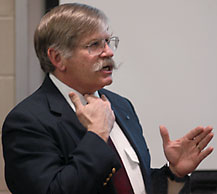 Dr. Allen Parmet associated with Midwest Occupational Medicine of Kansas City, MO gestures to his audience about the danger of exposure to the chemical diacetyl. (Photo by Vince Rosati)
Dr. Allen Parmet associated with Midwest Occupational Medicine of Kansas City, MO gestures to his audience about the danger of exposure to the chemical diacetyl. (Photo by Vince Rosati)
Students and guests recently eagerly dug into a bag of popcorn handed out at the start of a lecture at Missouri Southern State University by Dr. Allen Parmet. After Parmet, a specialist in occupational medicine, launched into his topic, There's An Epidemic in Jasper County: Popcorn Workers' Lung: the History, Biology and Occupational Heath Issues, he might not have had as many takers.
In the spring of 2000, 8 former workers at the Gilster-Mary Lee Corp., a microwave popcorn factory in Jasper, MO, became the source of an investigation into a new and lethal lung disease called bronchiolitis obliterans syndrome, a disease that obstructs the lungs. With the assistance of Parmet and other specialists, an investigation by Centers for Disease Control and Prevention/National Institutes for Occupational Safety and Health led to the discovery that exposure to the chemical diacetyl used in the butter flavoring was the cause.
"People who didn't think they were sick, were sick," he said. "Non-smokers were sicker than smokers."
Parmet explained how different his approach as an occupational medicine specialist was to that of a clinician. "I deal with healthy people in a sick environment," he said, as he went on to describe the conditions at the Jasper plant that led to statistical findings that exposure by production line workers to diacetyl led to their difficulty breathing. In making this conclusion, which Parmet said one didn't have to be a "genius" to make because of all the health records available, he showed how several disciplines came together in forming the science behind what he labeled as having "epidemic" proportions.
Alle Ding' sind Gift und nichts ohn' Gift; allein die Dosis macht, das ein Ding kein Gift ist. (German)
The dose makes the poison.
Paracelsus, 1567
Parmet stressed that the biochemistry of diacetyl, also a flavoring in coffee, is unknown. "Inhaling it is different that eating it," he said. "There must be a safe level. We don't know what it is."
On a political note, Parmet criticized H.R. 4167, the National Uniformity for Food Act of 2005 which has passed the House and gone to the Senate, saying it is a "blow to increased safety regulations." While the bill purports to establish uniform national labeling standards, many critics of it agree that in enabling federal regulators, it strips local and state food protection programs of their statutory authority.
The buck stops here
Could this health issue have been avoided? Parmet pointed out that the first cases of bronchiolitis obliterans were discovered in 1989 and only revealed through the discovery phase of a lawsuit in 1997 rather than through a report released to the general public.
In 1994 he said International Flavors and Fragrances, Inc. (IFF), the butter flavoring manufacturer had their employees wearing full respirators while only labeling their product "irritating." It was only after 2004, he said, that the product was considered "lethal". Manufacturers didn't reflect the hazards of inhalation of diacetyl on material safety data sheets until 2005. Prior to that, he said, OSHA called for safety but did nothing about defining "safe levels."
So far, hundreds of lawsuits have been filed against IFF and millions of dollars paid to injured workers in spite of the company's contention that it issued adequate warnings about handling its product. Four cases involving 7 plaintiffs resulted in jury verdicts totaling nearly $53 million that are now under appeal. IFF has awarded undisclosed sums of money to many other workers and their families.
Dr. Parmet holds a B.S. in chemical engineering from the U.S. Air Force Academy. He was awarded his M.D. by the University of Kansas, M.P.H. from the University of Texas, completed residencies in Aerospace Medicine and Occupational Medicine and has completed toxicology training at the University of Kansas and a fellowship in Space Medicine at the Johnson Space Center. He holds board certification diplomas in aerospace medicine, occupational medicine, and forensic medicine and as a U.S. federal medical review officer in forensic toxicology and has practiced medicine for over 30 years. He is the author of numerous medical books.






Comments